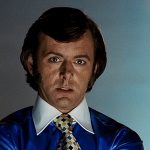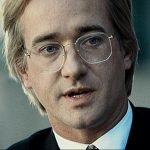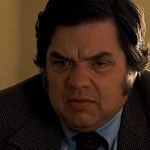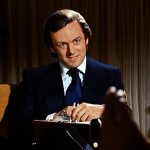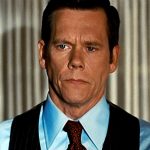Frost/Nixon – 2008
This was a good movie. It was a drama about the famous interviews between celebrity journalist David Frost, played by Michael Sheen, and President Richard Nixon, played by Frank Langella. Both men gave great performances, but special attention has to be given to Langella’s portrayal of the infamous politician.
We are taken on a journey that began with a little history lesson, showing how Nixon resigned the office of President because of the Watergate Scandal, and how he was pardoned by his successor, Gerald Ford. We are then introduced to the popular interviewer David Frost as he conceives of an idea to interview Nixon in an attempt to get from him a confession of guilt that, for lack of a trial, the world never received. It is made clear that in the beginning, Frost was in it for the ratings, nothing more. Nixon, a man languishing in retirement, agreed to participate in the interview in an effort to exonerate himself.
The film, which is based on a stage play of the same name, became a sparring match between the two men. Obviously, they each had their own agenda, but they each also had teams of supporters, advisors, and researchers who had their own goals as well. In Frost’s corner was his producer, John Birt, played by Matthew MacFadyen, as well as Bob Zeinick and James Reston Jr., played by Oliver Platt and Sam Rockwell. James harbored a personal contempt for Nixon, who he felt was a criminal who had dishonored the Office of the Presidency and betrayed the American people. Not on Frost’s professional team, but supporting him all the same is his girlfriend, Caroline Cushing, played by Rebecca Hall. In Nixon’s camp was his post resignation chief of staff, Jack Brennan, played by Kevin Bacon, and his publicist, Swifty Lazar, played by Toby Jones. And in a minor roll, there was Diane Sawyer, played by Kate Jennings. I thought it interesting to learn that early in her career, the famous journalist and television news anchor was part of Nixon’s White House staff.
The film focused most of its attention on Frost and his team of supporters, the conflicts within their group. They are almost portrayed as the underdogs. Their challenge was to force a confession out of Nixon, a task which many thought could not be achieved. Nixon was too much of a smooth talker, too much of a slippery politician. Frost was only used to interviewing entertainment celebrities and not accustomed to asking the hard kinds of questions that would get an admission of guilt from “Tricky Dick”.
And finally, about fifty-four minutes into the roughly two hour film, the first of the four interview sessions begins. To make a long story short, the rest of the movie covers the interviews, with small breaks between the sessions. The first three are dominated by Nixon who does a fantastic job of making himself look good while discussing his foreign policy achievements and his involvement in the Vietnam conflict. But in the fourth interview, Frost finally steps up to the plate and corners Nixon with evidence about the Watergate scandal. Nixon is forced to confess that mistakes were made and a sort of apology to the citizens of American is given, though he never actually admitted to being a criminal.
This movie is a dramatization of the interviews which took place in 1977. I was only four years old at the time, but I know people who remember the real interviews being televised. I have been told that for the most part thee film was an accurate portrayal. However, after doing a little research, I have learned that there were a few critical inaccuracies that were included to increase the dramatic tension. For example, according to Wikipedia, in the movie, Nixon admitted that he “‘…was involved in a cover-up’ as you call it.” But the audience can’t hear the ellipsis. What Nixon actually said was, “You’re wanting me to say that I participated in an illegal cover-up. No!” I think that makes it pretty clear that Peter Morgan, the man who drafted the screenplay, had his own agenda in writing the script.
Also, as an interesting little note, I found that the character of Jack Brennan was portrayed as too stern and militant. According to the real Diane Sawyer, who knew him, Jack was “the funniest guy you ever met in your life, an irreverent, wonderful guy. So there you go. It’s the movies.”
But aside from little things like that, the film was mostly historically accurate. Add to that some pretty incredible performances from Sheen and Langella, and you have a pretty compelling drama. I’m generally not interested in politics, but I was able to enjoy the film because the politics of the events were mostly taken out and replaced with the drama of two powerful men facing off from their interview chairs. In the end, Frost came out the winner.
